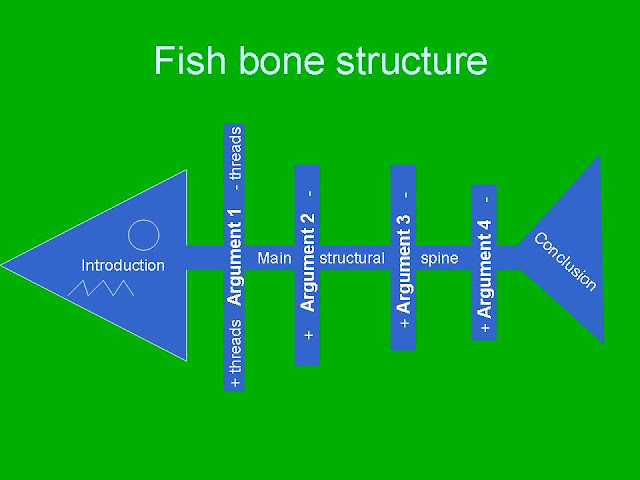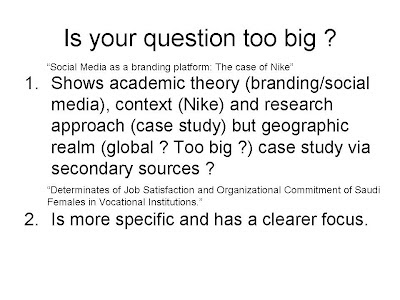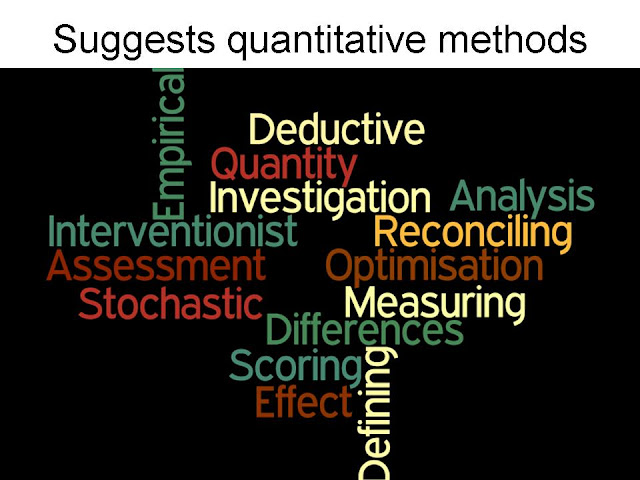The
biggest challenge you face writing your first or second literature review is understanding what is already out there. I often see students in a confused state, wondering how to approach the literature review. My experience, based on supervising more than 100 students, suggests that you need to be comfortable here with some ambiguity (an essential business skill), effectively operating in the zone of shades of grey (i.e. no black or white).
Ambiguity ?
Yup. You have an idea of what your question might be, a sense of the topic, but a sense that this may evolve as you learn more about the extant (existing) knowledge, become comfortable with the concepts and terminology, basically starting to get stuck into the detail (but recognise that you do not know that much). Don't be worried if you are confused.com.
I encourage students to get lost in the topic - this can be a very disconcerting experience - having perhaps "nailed" a title and been particularly pleased with a form of words that might become a dissertation question, you start reading academic journals that use terminology and a style that is really quite different to what you have seen before. The papers are 5,000 words long or more, written by PhD+ level academics, many very specialist. Your head begins to explode as you wobble between "I thought I had cracked this & knew what I was doing" and "I'm totally out of my depth".
TIP: learn to scan documents - not read them head to tail. Look for useful/interesting ideas, concepts, models. Read the abstract - relevant - yes - read on...... if not move on to the next one. Most academic journal papers offer a neat summary of the current literature on their subject (much like text books, but perhaps more current and specialist). If you are freaked out (challenged) by the detailed methods and analysis, move on. Look to pick up ideas, models, key authors, terminology. Them move on quickly.
You ideally should be picking up lots of small elements from a wide variety of sources, not looking to find one or two papers that are very close to your question. This is why we "read" for degrees in UK. Lots of reading. And more.
If papers are very close to your question - why are you undertaking the research ? The requirement is for originality, not re-crafting a paper that has already been written. Ensure you make very careful notes, with full referencing....there is nothing worse than flapping around just before the deadline looking to complete referencing. See this blog entry on Shell document creation.
Use these ideas/notes to create a mind map. (I call these brain maps. my son corrects me on this...)
The do not have to look pretty, and may well evolve.
just do it. you will feel better.
Do not rush things. Over a few days of research you will begin to have a feel for what the key areas of academic theory are that will be relevant for your question. The literature review needs to include analytical frameworks, analysis tools, key theory, industry related data/facts, all the reference material you will use later in the dissertation. Some want to add a 'background' section - don't - this material should fit in the literature review.

I've often been told by early stage dissertation students "there is no literature on my subject". "I am looking for gender and cultural differences in snail consumption" Full on - no irony. This is usually the function of one of two errors: (1) student had done no/very little reading (when I ask 'which online academic journal search engine have you used ?' = stoney silence) or (2) The (misguided) expectation that there are two or three amazing papers written specifically on gender and cultural differences in snail consumption that will form 3 of the 5 references for the paper.
Using the funnel concept above - area 1 might be "consumption", area 2 might be "culture", area 3 might be "gender & gender differences in eating" area 4 might be "snail consumption" area 5 might be "cultural differences in snail consumption". Note: not one of these topics fully addresses the set question - but you might be able to see how they link together (even loosely) and provide a platform to evaluate the question.

I love drawing this picture. 75% of the time it generates a BIG smile on my tutee's face. (my hand drawing is little better than my PowerPoint graphical skill..) "Yes ! I so get this...." is the feeling that is often created. Remember the news at 10. You get headlines (intro), you get detailed reports on the key news items (not everything - just the important stuff), then before they sign off they remind you of what has happened. Indicate. Tell. Remind. Each chapter should contain an introduction (sign posting or route planning in summary format what is coming, the journey, then a reminder of what the journey showed. The whole dissertation has the same format in totality and within each chapter.
Additionally, as suggested by this fish skeleton image, there is a main spine that links the ideas of the content. There might be 3, 4, 5, 6 or 7 main topics.

In each the key arguments (drawn from a variety of expert/authoritative sources...n.b. Wikipedia, Google, mysillywebsite.com are not usually recognised for their expert knowledge) is weighed carefully. Consider the pros and cons of a particular idea, consider the balance of views, the authoritativeness of views (sometimes the 'right' answer might be just a sole voice) - if you have understood the research being quoted (academic research often over relies on campus based research) you may be able to differentiate between strong, medium and weak sources. Try not to take strong, personal opinion based positions. Academic writing is objective and based on facts. The conditional tense is very useful at suggesting the author or the researchers perspectives might suggest, indicates strong support for, consensus of expert opinion, may, should, could....
Being critical is also very important. What is meant here is that the content does not just describe what others have written. The 'knitting' of perspectives can challenge or undermine. Identification of validity (sample size, recency, relevance, appropriateness) may also weaken arguments. Being critical is not putting across strong, personal opinions. As relatively inexperienced academic researcher your opinion carries little weight. (To be frank: I don't care what
you say - you need to use the published words of others as the swords of your arguments, you control their cut and thrust, you build the strategy and shape the fight - but this is not about your opinions, you are not an expert (yet)) Consideration of the full range of opinions is important (requires detailed research - particularly hunting down contrary view points if they have not emerged in the initial search).
How many references should I include ? I tend to ask for the gold standard (there is no upper limit - you include what you have used....) but four pages of double spaced Harvard referencing would be an appropriate bibliography for a literature review.
Please note: Full and accurate Harvard referencing is required. Look at the School materials for this. Learn it. Love it. Dream it.













